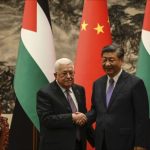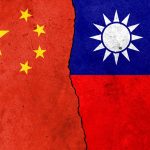BY LIANCHAO HAN AND BRADLEY A. THAYER
The Olympic Games bring athletes from five continents together to show sportsmanship, athleticism, friendship and respect in order to promote a better world. Unfortunately, in a deeply troubling act, just before the opening of the 2022 Beijing Winter Olympics, Chinese athletes demonstrated disrespect to the Games and, as hosts, to the world.
The Chinese official media reported that on Jan. 25, over 100 athletes and coaches from China’s Olympic team came to Tiananmen Square in the early morning to take an oath to fight for China’s victory. It was a scene reminiscent of Leni Riefenstahl’s work documenting the 1936 Olympics in Berlin. Headed by Wu Dajing, a speed skater and gold medalist in the Men’s 500 meter at the 2018 Winter Olympics in Pyeongchang, they uttered their war cries: “For the motherland — Charge! Charge! Charge! Always fight for first place and never give up; and victory to China.” Shockingly, sources on the ground say they also chanted: “Throw caution to the wind to repay the Leader (Xi Jinping), and follow the General Secretary (Xi Jinping), and move together to the future.” If that’s true, these slogans are similar to those uttered by the Red Guards to Mao Zedong, the patriarch of China, during the Cultural Revolution.
Interestingly, when the Chinese official media reported the event, they omitted the chants related to Chinese leader Xi Jinping. But the question is why the athletes reportedly swore oaths to win the Games for the leader of the Chinese Communist Party (CCP). China has criticized the United States and other democracies for politicizing the Olympics to protest against China’s genocide of Uyghur and other ethnic Muslims in Xinjiang. Such politicization violates and discredits the Olympic spirit, Chinese foreign minister Wang Yi has said. However, China has been exploiting the Olympics and other international sporting events as a powerful tool for its propaganda and political gains.
Like Adolf Hitler in 1936, or the Moscow Olympics of 1980 — boycotted by the U.S. and more than 65 other countries in protest of the Soviet Union’s invasion of Afghanistan — the CCP’s dictatorial regime attempts to create the image of a peaceful, tolerant rising power in order to cover up its domestic repression and global aggression.
In 2008, China hosted the Summer Games for the first time after spending enormous resources to win the competition to host the event, and even promised to improve human rights conditions in China to neutralize opposition. The theme was “One World, One Dream,” calling on the world to join in the Olympic spirit and build a better future for humanity. But the real message was that China had moved to the world center and was ready to exercise its power to change global governance. Less than a year after the event, the CCP began to slaughter hundreds of Uyghur protesters and made thousands “disappear” in Ürümqi, Xinjiang.
The official motto of the Beijing Winter Games is “Together for a Shared Future,” which is a highly politicized theme. China claims it represents the power of the Games to overcome global challenges as a “community with a shared future for humankind.” However, despite its fancy phraseology, the motto is a political double entendre. The phrase captures Xi’s ambition for China’s global expansion agenda and its plan to create a new world order of socialism with Chinese characteristics to replace the existing liberal order. Simply put, the freedom of the liberal order would be replaced by China’s totalitarian system with rapid economic growth at any cost.
This is worrying enough, but there are deeper concerns for global stability and human rights in China. First, the Tiananmen oath by China’s team revealed a fundamental change in China’s polity since 2008. That is, all of China’s achievements, including the would-be victory of the 2022 Winter Games, apparently now are tributes to Xi — all credit goes to him. This is much like the fanatic personal worship of Mao Zedong during the Cultural Revolution.
Second, the Tiananmen oath uses military narratives to frame the sporting event as a “war.” That is, China’s athletes are willing to “die” to secure the motherland’s inevitable victory. Such wolf-warrior rhetoric shows that China, under Xi, will employ all aspects of Chinese society to advance its strategic goal of winning the great power competition between China and the United States. This has reached the point of fanaticism. Perhaps an oath worshiping Xi was so nakedly aggressive and embarrassing for the world to hear that China’s official media did not report it.
Since the founding of the People’s Republic of China, the CCP has taken advantage of international sporting events for its political purposes. It has spent much money to raise a large army of professional athletes while many of its people were starving. These athletes’ only job was to win, so that they could stand on the podium and get China recognition with its national flag raised and its national anthem played.
Xi Jinping is a student of Mao Zedong’s trickery. In 2019, he instructed the staff of the 2022 Beijing Winter Olympic Games Committee that China must become a sports superpower. This was not just because being a power in international sports is an important part of the realization of Xi’s “Chinese Dream,” but also because athletic successes yield powerful spiritual strength that can bind the Chinese people’s hearts and minds for the “great rejuvenation” of the nation.
Hitler used the international spotlight of the 1936 Games to beautify the Third Reich and portray it as a benign, benevolent, hospitable and peace-loving country, while secretly advancing its racist agenda and preparing for a world war. The U.S. and many other countries were deceived, participated in the Nazis’ propaganda, and lost a unique opportunity to embarrass and undermine Hitler’s regime. Communist China is doing the same thing. The world cannot afford to lose the opportunity to signal that it is aware of the CCP’s dictatorial rule, genocide in Xinjiang, and other gross human rights abuses against the Chinese people.
Regrettably, as in 1936, 1980 and 2008, the 2022 Winter Olympics once again will be the case of a dictator employing the Olympics to advance his end. China has changed significantly between 2008 and 2022, becoming more aggressive and dangerous. This month’s Games may define the end of an era of relative peace before China moves the world into a new conflict.
Lianchao Han is vice president of Citizen Power Initiatives for China. After the Tiananmen Square Massacre in 1989, he was one of the founders of the Independent Federation of Chinese Students and Scholars. He worked in the U.S. Senate for 12 years, as legislative counsel and policy director for three senators.
Bradley A. Thayer is the co-author of “How China Sees the World: Han-Centrism and the Balance of Power in International Politics.”
This article first appeared in The Hill
This article first appeared in The Hill
OPINION CONTRIBUTORS – 02/03/22 1:30 PM ET























